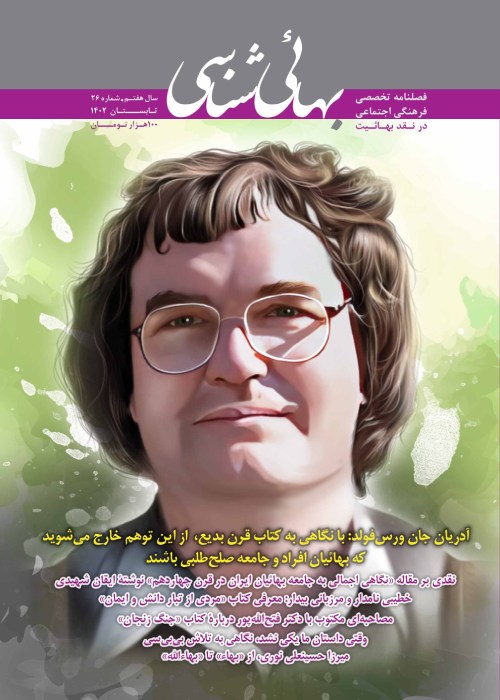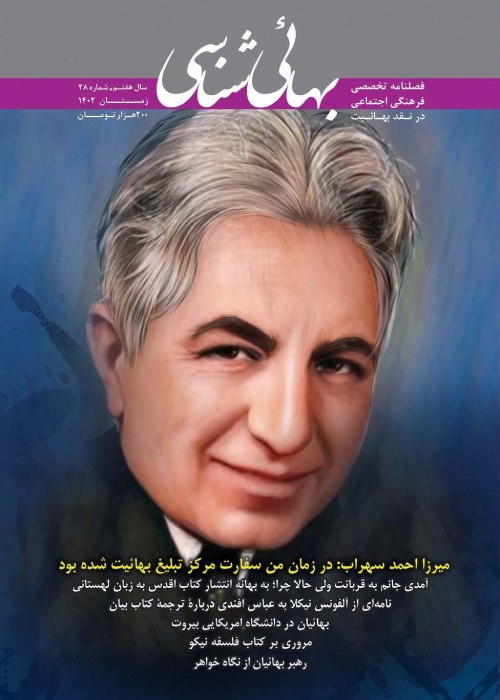فهرست مطالب

نشریه بهائی شناسی
پیاپی 26 (تابستان 1402)
- تاریخ انتشار: 1402/06/28
- تعداد عناوین: 10
- سرمقاله
-
صفحات 4-25
- روی خط خبر
-
خطیبی نامدار و مرزبانی بیدار / معرفی کتاب «مردی از تبار دانش و ایمان«صفحات 26-31
-
وقتی داستان ما «یکی» نشد / نگاهی به تلاش BBC پس از یک کمپین ناموفقصفحات 32-43
-
مصاحبه ای مکتوب با جناب آقای دکتر پرویز فتح الله پور / درباره کتاب «جنگ زنجان«صفحات 44-57
-
صفحات 58-97
-
صفحات 98-115
-
آیا آیین بهائی الهی است؟ / بررسی ادعای خدایی باب و بهاءاللهصفحات 116-137
-
رسانه آسو؛ از پویش روشن فکر مآب تا اقدام سیاسی / پرونده ای درباره موسسات ملهم از تعالیم بهائی (قسمت اول)صفحات 138-155
-
صفحات 225-231
-
Pages 58-97
Adrian Worsfold, a graduate of Sociology of Religion, is active in the field of art and media and social writing and virtual space, with a history of teaching in high school and university, as well as being an orator and preacher in Unitarian and Anglican churches. In the course of his religious studies, he got to know the Baha'is and while reading the academic books of the Baha'i missionaries and critics, he also attended the Baha'i missionary meetings and got to know the Baha'is and their culture face-to-face. After this acquaintance, he believes that the main leaders and Bahá'í missionaries do not have the honesty expected from divinely chosen leaders and religious persons. Although Baha'i has a shell of Christianity and modernity and modern western culture, in fact, it is a strongly dogmatic and backward religion, with unchangeable rules of the 19th century, with self-made management influenced by the leadership of Marxist organizations known as Centralism. While looking at the background of Babi and war-mongering of Baha'u'llah, and warning about the deceitful and dishonest actions of Abbas Effendi and Shoghi Effendi, about the deception of Baha'is in Christian communities, he warns the people that according to Baha'i teachings and rules, the House of Justice consists of members only Baha’i intends to take over the position of the legislative, executive and judicial powers of the global unified government, which is a very dangerous idea. Looking at the performance of Baha'i leaders in the censorship and control of the academic works of Baha'i writers, the elimination and rejection of opponents, the lack of attention to the suppression of the truth, freedom of thought, the lack of equal rights of men and women, and the disregard of the Baha'i principle of compatibility of religion with science and reason, he advises them to show tolerance for different ideas and opinions by adapting Abrahamic religions and accept the opinions of opponents and critics. Otherwise, they will suffer marginal life and gradual deterioration. In his opinion, the small and insignificant population of British Baha'is, despite their 120-year history and unconventional propaganda, is a sign of this life and gradual decline.
Keywords: Baha’i critics, Adrian Worsfold, Christianity, Bahá'í criticism, Bahá'í theology, interpretationof Bahá'í opinion towards Christianity, Baha’i contradictions -
Pages 98-115
Mirza Hussain Ali Nouri founded the Bahá'í Faith by attributing himself to a Bábí origin and by claiming to have been chosen by God in the position of Man Yazhraul Allah (the promise of the Báb and the abrogator of his religion). He was first known as "Bahá" among the Bábís, and after rejecting the Báb religion, he called himself "Bahá'u'lláh". In the gathering of Badasht Valley, Qurrat Al-Ain gave him the title of "Baha", but this title was used by the Bab for someone else, and the Bab referred to him only with the alphabetical equivalent of "Hussein Ali", i.e. 238. Also, for some of his prominent followers, the Bab chose a name from the Names of Allah, which was the same as their name, as their nickname and called them "Names of Allah". Therefore, in the eyes of the Bab, Mirza Hussein Ali was not among his prominent followers who did not give him a nickname. This article aims to show that neither the title "Bahá" nor the title "Bahá'u'lláh" can be applied to him in all the Báb's teachings.
Keywords: Mirza Hossein Ali Nouri, Seyyed Ali Mohammad Bab, Mirza Yahya Sobh Azal, Bahaand Baha’u’llah -
Pages 116-137
One of the most important criteria for distinguishing the divine school from the non-divine is its approach to the belief of monotheism, which means the oneness of God. Monotheism is the most important principle of Islam. One of the groups that introduce itself as a divine and monotheistic religion is Baha'i. This article seeks to answer the question, what is the most important criterion and measurement for the truth of the claims of the divinity of religions, and is Baha'i a divine and monotheistic religion? In response, the belief in the monotheism of Almighty God is one of the most reliable indicators and criteria of a religion's divinity and non-humanity, and it has been shown that the claims of divinity and lordship of the Baha'i leaders do not allow Baha'ism to be accepted as a divine religion. Also, in this study, the responses and justifications of the Baha'is to the claims of their leaders have been discussed and the criticisms that have been made to them have been presented. One of the most common justifications is the use of Islamic mystics' materials, which, in addition to the impossibility of adapting those materials to the claims of divinity, can be found in the documents and works of Baha'i leaders.
Keywords: divine religion, monotheism, prophets, Baha'i, Baha'u'llah, Bab, divinity -
Pages 138-155
In the mid-20s, Aasoo Media started its activities in various formats such as media, podcasts, articles, books, etc. This media covers a wide range of social, political, cultural, artistic, legal, etc. issues and has introduced its goal “to promote dialogue and tolerance in the public sphere”. This article explains that contrary to Aasoo's dialogic claim and Baha'i's avoidance of political activity, this media has a political nature and moves in line with the grand plan organized by the House of Justice. Aasoo Media is heavily funded by Taslimi Foundation in America. In the first part of this article, it is explained that Taslimi Foundation is one of the "institutions inspired by Baha'i teachings" as the top of the Aasoo pyramid, and it is obliged to implement a project in the form of “social action” in line with the time plans of UHJ (Beit –ul -Adl).
Keywords: Aasoo, Baha'i, Taslimi foundation, social action -
Pages 156-223
This article criticizes the article "An Overview of Baha'i Society of Iran in the 18th Century" written by Iqan Shahidi. In this regard, the contradictions in speech and behavior of Baha'i leaders and elders and their way of life, which is based on complete contradiction with Baha'i teachings, as well as brief hints about the thoughts and beliefs of Ali Muhammad Báb, Baha'u'llah and `Abdu'l-Bahá regarding the unity of the human world and the search for truth have been made. It has been explained about the footprints of the Baha'is in the critical and decisive moments of Iran's history, such as the Constitution Movement and the hidden role of the Baha'is in the formation of its disturbances, from Bath water pool Movement and the entry of Shower in Iran to examples of the Baha'is' interference in Iran's government since a long time ago. The organizational and organizational nature of Baha'ism, and the oppressive behavior and hatred of Baha'is are also stated. In addition, to the true view of the Baha'i leaders about the equality of men and women, the true causes of the apparently benevolent and philanthropic activities of the Baha'is in the form of education and training, the position of 'Abdu'l-Bahá's explanation and interpretation, the differences of the Baha'is from long ago to the present day, and the main origin of 'Abdu'l-Bahá's Madaniyyah Resaleh book. Shoghi's personality traits and his actions during his leadership have been investigated. It has become clear that Bahá'í is trying with all its might to introduce itself as a progressive religion and Bahá'í missionaries, following their leaders, consider all past religions to be ancient and their religion to be in line with the present and modern times! This claim has been verified by Eric Stetson, one of the Baha'i intellectuals, and according to it, he concludes that the Baha'i religion, contrary to the slogan of its missionaries, is extremely conservative and backward! In general, according to the process of Mr. Shahidi's article, we took a quick look at the historical truth of Baha'ism and talked about the illegitimate nature of justice based on Baha'i texts. In the end, we raised some questions with Mr. Shahidi. What is certain is the existence of the fact that during these years, countless Baha'is have come across lies and contradictions in their religion, which has caused the search for the truth and finally finding the real truth.
Keywords: Iqan Shahidi, Search for thruth, Baha'i community, unity of mankind, unity of the humanworld, equality of men, women, differences of Baha'i leaders, illegitimacy of UHJ(Baital-adl)


